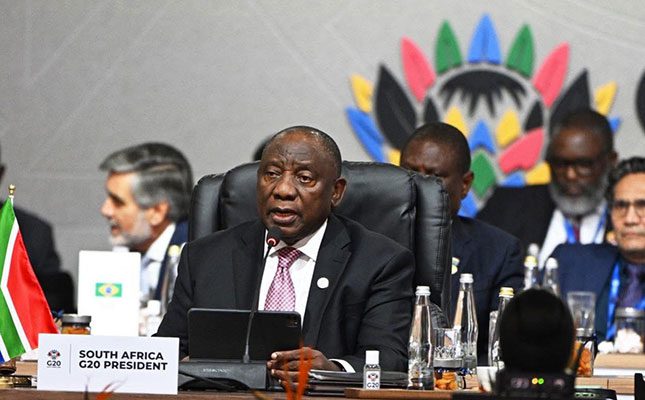
Delivering his closing remarks, he highlighted a renewed spirit of multilateral co-operation that emerged from the gathering.
The unanimous adoption of the final declaration by the world’s most powerful and industrialised economies came despite strong opposition from the US and against the express wishes of President Donald Trump.
At the first G20 Summit ever hosted on African soil, Ramaphosa thanked global leaders for their support during South Africa’s presidency and for reaffirming the G20’s role as the leading platform for international economic co-operation.
He described the summit as a milestone, emphasising Africa’s central role in the global agenda.
“The greatest opportunity for prosperity in the 21st century lies in Africa,” he said, urging stronger partnerships between the continent, the G20, and the broader international community to unlock Africa’s potential.
With conflicts, economic instability, and climate pressures shaping the global landscape, Ramaphosa called for a renewed commitment to peace, justice, and sustainable development.
He stressed the urgency of ending poverty, reducing inequality, addressing developing nations’ growing debt burdens, and accelerating progress toward the UN’s Sustainable Development Goals.
“The G20 has pledged to extend support to low- and middle-income countries as they confront debt vulnerabilities,” he noted, calling for a “virtuous cycle of reduced debt, higher public investment, and inclusive growth.”
Climate action was a central theme of South Africa’s presidency. Ramaphosa highlighted advances in mobilising finance for a just energy transition and called for increased investment in disaster resilience and recovery efforts.
South Africa also introduced the High-Level Voluntary Principles for Investing in Disaster Risk Reduction, aimed at strengthening global co-operation on climate resilience.
He reaffirmed commitments to expand climate finance, enhance multilateral development banks, and support developing economies in their transition to low-carbon energy. “Climate change touches every nation, but its impacts are unevenly felt,” he said, emphasising the need for fairness and inclusion in global climate efforts.
The summit also endorsed the G20 Critical Minerals Framework, a co-operative plan to ensure mineral resources support sustainable development rather than exacerbate inequality.
Reflecting on South Africa’s presidency, Ramaphosa said it built on the developmental agendas of Indonesia, India, and Brazil, placing the priorities of Africa and the Global South “firmly at the heart” of the G20’s work.
As the summit drew to a close, Ramaphosa urged the international community to accelerate efforts toward achieving the 2030 Sustainable Development Goals and advancing the Pact for the Future.
“We have laid the foundation of solidarity; now we must build the walls of justice and the roof of prosperity,” he said.
“Together, we can ensure that no one is left behind.”
Get trusted farming news from Farmers Weekly in Google Top Stories.
➕ Add Farmers Weekly to Google ✔ Takes 10 seconds · ✔ Remove anytime






